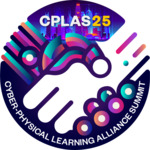 | CPLAS25: Cyber-Physical Learning Alliance Summit 2025 HKUST HONG KONG, Hong Kong, June 4-5, 2025 |
| Conference website | https://cplas25.hk/ |
| Submission link | https://easychair.org/conferences/?conf=cplas25 |
| Abstract registration deadline | February 15, 2025 |
| Submission deadline | February 15, 2025 |
| Contact | cplas2025@ust.hk |
The 2nd Cyber-Physical Learning Alliance Summit (CPLAS 2025) will bring together researchers, faculty members, industry professionals, and decision-makers from around the world to explore evolving practices and innovations in cyber-physical learning (CPL). Hosted by the Hong Kong University of Science and Technology (HKUST), CPLAS 2025 aims to foster international collaboration, share cutting-edge practices, and push the boundaries of CPL.
This year’s theme, "Connecting Minds, Technology, and Learning Spaces", will focus on pivotal topics including Artificial Intelligence, Learning Analytics, Human-Centric Learning, Engagement in Immersive Learning, and the Ethics of CPL. Attendees will have the opportunity to participate in collaborative workshops, design-thinking sessions, immersive learning activities, and discussions, all aimed at enhancing the understanding and impact of CPL in educational contexts.
OOrganized by the Cyber-Physical Learning Alliance (CPLA), which was founded in 2023 by leading institutions, including Aalto University (Finland), Bently University (United States), Hong University of Science and Technology (Hong Kong), NEOM University (Saudi Arabia), Singapore University of Technology and Design (Singapore), Tecnológico de Monterrey (TEC, Mexico), The University of Ottawa (Canada), and Zhejiang University (ZJU, China), CPLAS 2025 will serve as a key platform for advancing CPL research and implementation.
The summit will be held in person at the Hong Kong University of Science and Technology on June 4th and 5th, 2025.
Sub-Themes
1. Data-Driven Education
This subtheme explores the transformative role of data in education, focusing on how analytics, real-time feedback, and predictive insights can personalize learning and enhance teaching effectiveness. Topics include ethical data practices, adaptive learning, and using data to inform decision-making, creating responsive, evidence-based educational environments that drive student success.
2. Artificial Intelligence in Education:
This subtheme examines how AI is reshaping educational practices, from enhancing instructional methods to improving learning outcomes. It covers AI-driven personalization, automation in assessment, intelligent tutoring systems, and ethical considerations, focusing on both the transformative potential and challenges AI brings to teaching and learning environments.
3. Innovative Learning Space
This subtheme explores the design and utilization of physical and digital learning environments that enhance engagement, flexibility, and collaboration. It examines how adaptable, technology-enabled spaces can support diverse teaching approaches, foster active learning, and accommodate various learning styles, creating environments that inspire creativity and interaction in educational settings.
4. Synchronous Seamless Learning:
This subtheme focuses on creating fluid, real-time learning experiences that bridge in-person and virtual environments. It explores strategies for achieving continuity and engagement in hybrid and remote settings, leveraging technology to support live interaction, collaborative activities, and a cohesive learning experience that transcends physical boundaries.
5. Human-Centered and Ethical Cyber-Physical Learning
This subtheme focuses on integrating technology in education with a human-centered, ethical approach. It addresses inclusive design, ethical data practices, and the balance between automation and personal interaction, ensuring that cyber-physical systems respect privacy, promote equity, and prioritize learners' well-being in tech-enhanced environments.
6. Engagement in Immersive Learning and Extended Reality:
This subtheme explores the role of immersive technologies, such as Extended Reality (XR), in enhancing learner engagement and interaction. It examines how VR, AR, and mixed reality create experiential learning opportunities, deepen understanding, and foster active participation, transforming traditional learning into dynamic, hands-on experiences across disciplines.
Submission Guidelines
-
All abstracts must be submitted and presented in English and follow the ACM proceedings format.
-
Abstracts should be based on any of Summit’s subthemes
-
Abstracts should be 400-500 words in length and follow the Need-Based Approach.
-
Context and Need: Description of what is known and the identified need
-
Approach: Details of the intervention or study design
-
Significance: Implication or contributions of the study to the field
-
Abbreviations should be defined the first time they appear in your text. Abbreviations should neither be defined nor used in the abstract title.
-
Tables, charts or other graphics should not be included and will be disregarded by the reviewers.
-
All submissions will undergo a double-blind peer review process. Authors should ensure that their submissions are anonymized. Each submission will be reviewed by at least two experts in the field.
-
If you encounter any problems during the submission process or you do not receive any confirmation by email, please contact cplas2025@ust.hk
|
|
Dates |
|
Submission of Abstract |
15 February 2025 |
|
Notification of Abstract Acceptance |
31 March 2025 |
